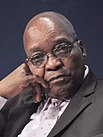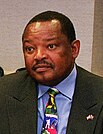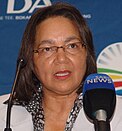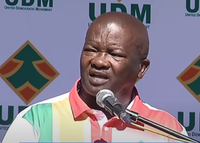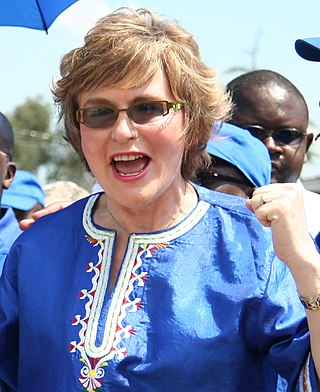
Otta Helene Maree, known as Helen Zille, is a South African politician. She has served as the Chairperson of the Federal Council of the Democratic Alliance since 20 October 2019. From 2009 until 2019, she was the Premier of the Western Cape province for two five-year terms, and a member of the Western Cape Provincial Parliament. She served as Federal Leader of the Democratic Alliance from 2007 to 2015 and as Mayor of Cape Town from 2006 to 2009.

Mosiuoa Gerard Patrick Lekota is a South African anti-Apartheid revolutionary for the African National Congress (ANC) who served jail time with Nelson Mandela from 1985 and who left the ANC to form the Congress of the People (Cope) splinter party in 2008. He has served as its President since 16 December 2008.
Mbhazima Samuel Shilowa is a retired South African politician and former trade unionist. He was the third Premier of Gauteng between 1999 and 2008. He was formerly the general secretary of the Congress of South African Trade Unions (Cosatu) between 1993 and 1999, and he later became a co-founder of the Congress of the People (Cope).

Kgalema Petrus Motlanthe is a South African politician who served as the 3rd president of South Africa from 25 September 2008 to 9 May 2009, following the resignation of Thabo Mbeki. Thereafter, he was deputy president under Jacob Zuma from 9 May 2009 to 26 May 2014.

South Africa since 1994 transitioned from the system of apartheid to one of majority rule. The election of 1994 resulted in a change in government with the African National Congress (ANC) coming to power. The ANC retained power after subsequent elections in 1999, 2004, 2009, 2014, and 2019. Children born during this period are known as the born-free generation, and those aged eighteen or older, were able to vote for the first time in 2014.
The 52nd National Conference of the African National Congress (ANC) was held in Polokwane, Limpopo, from 16 to 20 December 2007. At the conference, Jacob Zuma and his supporters were elected to the party's top leadership and National Executive Committee (NEC), dealing a significant defeat to national President Thabo Mbeki, who had sought a third term in the ANC presidency. The conference was a precursor to the general election of 2009, which the ANC was extremely likely to win and which did indeed lead to Zuma's ascension to the presidency of South Africa. Mbeki was prohibited from serving a third term as national President but, if re-elected ANC President, could likely have leveraged that office to select his successor.
The 51st National Conference of the African National Congress (ANC) was held at the University of Stellenbosch in Stellenbosch, Western Cape, from 16 to 20 December 2002, during the ANC's 90th anniversary. President Thabo Mbeki was re-elected to the party presidency and, notably, there was no change in other five top leadership positions except for Deputy Secretary General. There was also little competition for other spots on the National Executive Committee (NEC). This ANC conference has thus been called "the quietest in its history."

Municipal elections were held in South Africa on 18 May 2011, electing new councils for all municipalities in the country. Municipal elections are held every five years, and the previous municipal elections were held in 2006. The first municipal elections following the reorganisation of municipalities took place in December 2000.
An indirect presidential election was held in South Africa on 25 September 2008 following the resignation of the President Thabo Mbeki. The ruling party, the African National Congress (ANC), with a two-thirds majority in the National Assembly of South Africa, elected Kgalema Motlanthe as president. The ANC indicated that Motlanthe would be a "caretaker" president until the 2009 election, after which ANC president Jacob Zuma would take office.

The Congress of the People (COPE) is a South African political party formed in 2008 by former members of the African National Congress (ANC). The party was founded by former ANC members Mosiuoa Lekota, Mbhazima Shilowa and Mluleki George to contest the 2009 general election. The party was announced following a national convention held in Sandton on 1 November 2008, and was founded at a congress held in Bloemfontein on 16 December 2008. The name echoes the 1955 Congress of the People at which the Freedom Charter was adopted by the ANC and other parties, a name strongly contested by the ANC in a legal move dismissed by the Pretoria High Court.

The politics of the Western Cape differs from that of most other provinces in South Africa, because, unlike the other provinces, the African National Congress (ANC) does not dominate the political landscape. Instead, the province is a stronghold for the Democratic Alliance (DA), which has won a majority of the vote in the province in every national, provincial, and municipal election since 2009. The Western Cape's political landscape is also notable for the presence of a relatively strong local devolution and separatist movement.
Vusumzi "Vusi" Pikoli is a South African advocate and the former head of South Africa's National Prosecuting Authority. He is noted for instigating criminal charges against disgraced South African police commissioner Jackie Selebi and ANC president Jacob Zuma. In 2008 he was suspended from his duties by President Thabo Mbeki, a close confidant of Selebi, and then subsequently fired by Mbeki's successor, Kgalema Motlanthe, who is an ally of Zuma. As such, opposition parties and sections of the press have claimed Pikoli is the victim of two separate political conspiracies. In October 2014 Pikoli was appointed as the Western Cape's first police ombudsman by Premier Helen Zille, whose choice was unanimously backed by the provincial legislature's standing committee on community safety.
Phaswana Cleopus Sello Moloto is a South African politician and diplomat from Limpopo. He was the second Premier of Limpopo from April 2004 until March 2009. He resigned after defecting from the African National Congress (ANC) to the Congress of the People (COPE).

General elections were held in South Africa on 7 May 2014, to elect a new National Assembly and new provincial legislatures in each province. It was the fifth election held in South Africa under conditions of universal adult suffrage since the end of the apartheid era in 1994, and also the first held since the death of Nelson Mandela. It was also the first time that South African expatriates were allowed to vote in a South African national election.
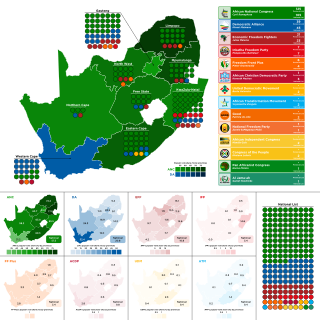
General elections were held in South Africa on 8 May 2019 to elect a new President, National Assembly and provincial legislatures in each province. These were the sixth elections held since the end of apartheid in 1994 and determined who would become the next President of South Africa.
Mcebisi Skwatsha is a politician from the Western Cape. He is currently serving as the Deputy Minister of Agriculture, Land Reform and Rural Development since May 2019. Before that portfolio was established, he was Deputy Minister of Rural Development and Land Reform from 2014 to 2019.

The Electoral Commission of South Africa (IEC) announced on 20 March 2019 that a record number of 48 parties had registered candidates for the national parliamentary election. This is 19 more parties that contested the 2014 national elections. In the provincial legislature elections, the total number of parties registering candidates were:

The 2009 Western Cape provincial election was held on 22 April 2009 alongside the 2009 general elections to elect the 42 members of the 4th Western Cape Provincial Parliament. It was the third time in provincial history that saw a change of government.

Zoliswa Albertina Kota-Mpeko is a South African politician from the Western Cape. A member of the African National Congress (ANC), she served as Deputy Minister of Human Settlements between May 2009 and May 2019. She served six terms in the National Assembly of South Africa.
Lincoln Vumile "James" Ngculu is a South African businessman, politician, and former anti-apartheid activist. He represented the African National Congress (ANC) in the National Assembly from 1998 to 2009 and was provincial chairperson of the ANC's Western Cape branch from 2005 to 2008.



